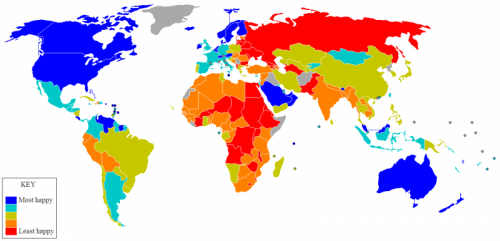 Indians are fast losing on the happiness front, says the UN World Happiness Report 2015, adding that the country has significantly lost six places in the well-being rankings of 158 countries since the last report that two years ago.
Indians are fast losing on the happiness front, says the UN World Happiness Report 2015, adding that the country has significantly lost six places in the well-being rankings of 158 countries since the last report that two years ago.
India is placed at 117th position with a score of 4.565 on scale of zero to 10. In 2013, the country was ranked 111th with a score of 4.772.
For other South Asian countries, Pakistan has maintained its position at 81 with a score of 5.194 out of 10 while Bangladesh is at 109th spot with a score of 4.694.
Nepal grabbed 121st position with a score of 4.514 while Sri Lanka is at 132nd spot in the rankings that is led by Switzerland and followed by Iceland and Denmark to fill the top three positions.
“As the science of happiness advances, we are getting to the heart of what factors define quality of life for citizens. We are encouraged that more and more governments around the world are responding with policies that put well-being first,” explained lead author professor John F Helliwell from the University of British Columbia and the Canadian Institute for Advanced Research.
“Countries with strong social and institutional capital not only support greater well-being, but are more resilient to social and economic crises,” he added.
On a scale running from 0 to 10, people in over 150 countries, surveyed by Gallup over the period 2012-15, reveal an average score of 5.1 (out of 10).
Six key variables explain three-quarters of the variation in annual national average scores over time and among countries.
They are real GDP per capita, healthy life expectancy, having someone to count on, perceived freedom to make life choices, freedom from corruption and generosity.
“This year, for the first time ever, the report breaks down the data by gender, age and region and finds striking differences, some much larger than have previously been found,” the authors noted.
The first World Happiness Report, released in 2012 ahead of the UN high-level meeting on Happiness and Well-being, drew international attention as a landmark first survey of the state of global happiness.
The latest report digs even deeper into the data looking at country trends since the first report, regional indicators, factors in gender and age and the importance of investing in social capital.
“It demonstrates that well-being and happiness are critical indicators of a nation’s economic and social development and should be a key aim of policy,” Helliwell emphasised.
The report gives evidence on how to achieve societal well-being.
It is not by money alone but also by fairness, honesty, trust and good health.
“The evidence here will be useful to all countries as they pursue the new Sustainable Development Goals (SDGs),” the team pointed out.
“As we consider the value of happiness in this report, we must invest early on in the lives of our children so that they grow to become independent, productive and happy adults, contributing both socially and economically,” the authors concluded.
The report also demonstrates that a key national challenge is to ensure that policies are designed and delivered in ways that enrich the social fabric, and teach the power of empathy to current and future generations.